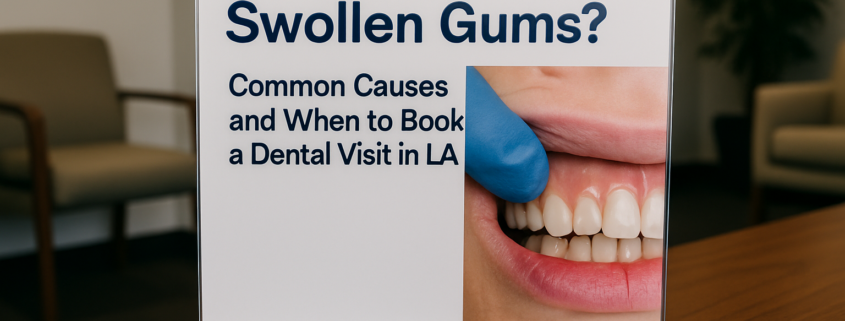Swollen Gums? Common Causes and When to Book a Dental Visit in LA
Swollen gums might seem like a minor nuisance—until they’re not. If your mouth feels tender, your gums look puffier than usual, or there’s a little bleeding when you brush, it’s not just a “skip-the-dentist” moment. These symptoms could be a neon sign flashing a bigger oral health issue. In Los Angeles, where green smoothies and yoga reign, your gum health deserves just as much daily care.
Understanding the swollen gums causes can help you act early, prevent more serious dental conditions, and keep your smile in check. Whether you’re dealing with soreness, inflammation, or just curiosity, this guide walks you through the main culprits—and when to call your LA dentist.
TLDR – Quick Guide
- Swollen gums can be caused by everything from plaque buildup to vitamin deficiencies.
- Ignoring inflammation could lead to gum disease, tooth loss, or systemic health problems.
- Some causes require immediate dental intervention, while others may just need better hygiene or dietary changes.
- In Los Angeles, dentists like Dr. Valery Sweeny offer comprehensive care with a focus on prevention and education.
Detailed Breakdown: Swollen Gums Causes
1. Poor Oral Hygiene
Let’s start with the classic culprit. When plaque hangs around your gumline, it turns into tartar and irritates your gums. The result? Swelling, redness, and bleeding when you brush. Skipping flossing or brushing half-heartedly allows bacteria to thrive, leading to gingivitis, the earliest form of gum disease.
According to the CDC, nearly half of adults aged 30 and older show signs of gum disease.
2. Gum Disease (Periodontitis)
If gingivitis is left untreated, it can develop into periodontitis—an advanced stage of gum disease. This condition damages the soft tissue and bone supporting your teeth. Swollen gums here aren’t just inflamed; they’re often painful and accompanied by bad breath or gum recession.
The American Academy of Periodontology recommends regular checkups to prevent and detect periodontitis early.
3. Vitamin Deficiencies
Your diet might be sabotaging your gums. Deficiencies in Vitamin C (linked to scurvy) or Vitamin D can make gums inflamed and more prone to bleeding. This is more common in people with restrictive diets or absorption issues.
4. Hormonal Changes
Pregnancy, menstruation, or menopause can trigger gum inflammation due to hormonal fluctuations. Estrogen and progesterone levels increase blood flow to the gums, making them more sensitive to plaque.
Pregnant women are particularly prone to “pregnancy gingivitis,” which affects 60–75% of expectant mothers.
5. Medication Side Effects
Some medications, such as calcium channel blockers, anti-seizure drugs, and immunosuppressants, can cause gum overgrowth or inflammation. If you’ve recently started a new prescription and noticed gum changes, bring it up with your dentist.
6. Tobacco Use
Smoking or chewing tobacco not only stains your teeth—it also restricts blood flow to the gums, reducing healing ability and masking early signs of inflammation. It’s a major contributor to gum disease.
7. Allergic Reactions or Ill-Fitting Dental Appliances
Reactions to toothpaste ingredients, mouthwash, or poorly fitting dentures/braces can also inflame your gums. If your symptoms started with a new product or appliance, there’s a chance your gums are telling you they don’t approve.
When to Book a Dental Visit in LA
Here’s your rule of thumb: If gum swelling lasts more than a week or gets worse, it’s time to see a dentist. Other red flags include:
- Persistent bleeding during brushing or flossing
- Bad breath that won’t go away
- Gum recession or teeth that look longer
- Pain while chewing
- Loose teeth
In Los Angeles, top-rated practices like Valery Sweeny, DDS offer expert diagnosis and treatment plans tailored to your lifestyle and health needs.
Key Takeaways
- Swollen gums are your body’s SOS signal. Don’t ignore them—especially if symptoms persist.
- Common causes include poor oral hygiene, gum disease, hormone changes, and vitamin deficiencies.
- Smoking and medications can also trigger gum inflammation.
- Preventive care and professional cleanings are essential in managing and avoiding swollen gums.
- If symptoms linger or worsen, a dental visit in LA should be your next move.
FAQs
Can stress cause swollen gums?
Yes. Chronic stress can weaken your immune system, making it harder for your body to fight off infections—including those in your gums.
How do I treat swollen gums at home?
Start with gentle brushing, flossing, and rinsing with warm salt water. Avoid irritants like alcohol or tobacco. But don’t rely solely on home care if symptoms persist.
Are swollen gums always a sign of gum disease?
Not always. They could be due to allergies, new dental products, or hormonal changes. But it’s best to rule out gum disease with a professional exam.
What foods help reduce gum inflammation?
Vitamin-rich foods like leafy greens, citrus fruits (for Vitamin C), and fatty fish (for Omega-3s) can support gum health. Hydration is key too.
How often should I see a dentist to prevent gum problems?
Twice a year is standard, but if you’re prone to gum issues, your dentist may recommend visits every 3–4 months.




Leave a Reply
Want to join the discussion?Feel free to contribute!